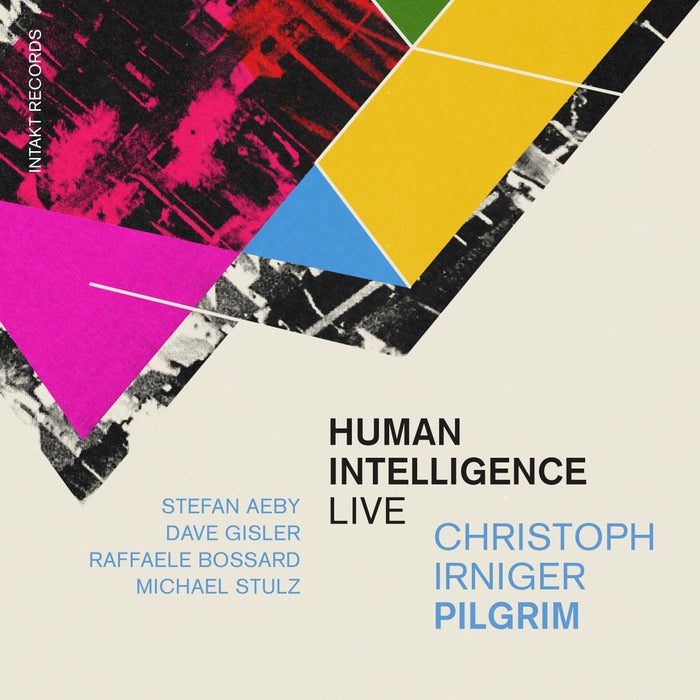
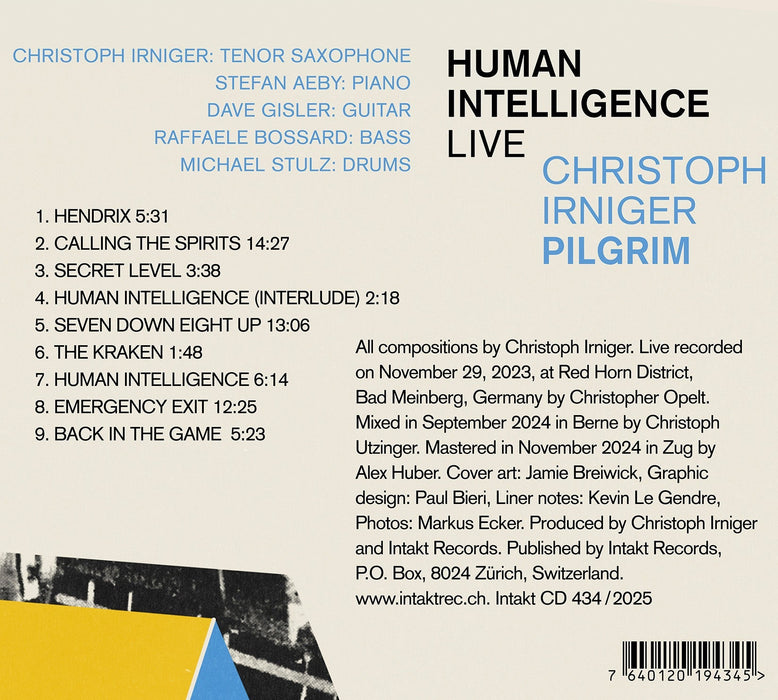
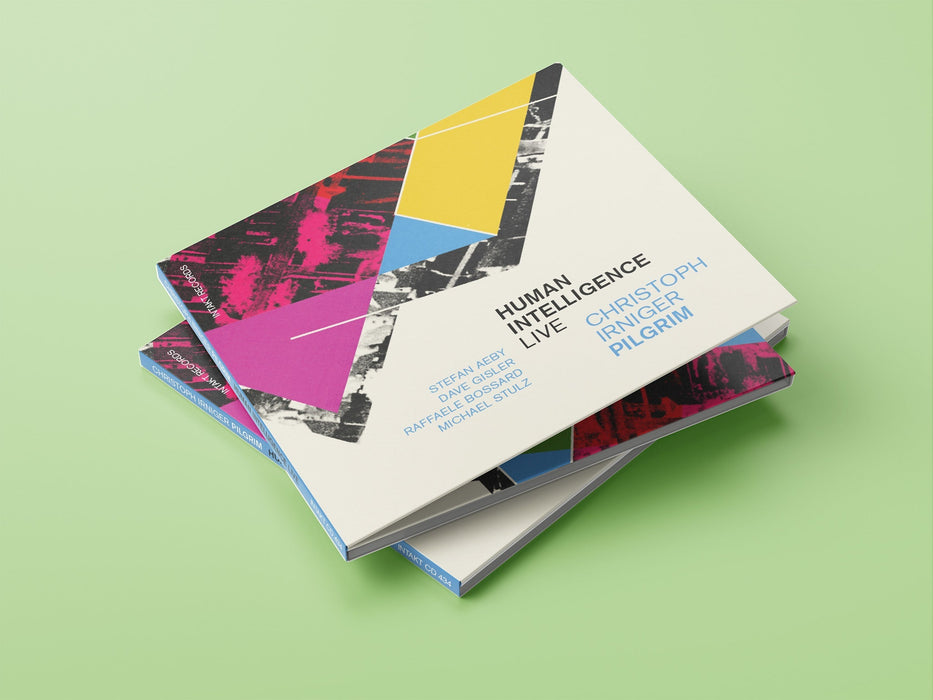
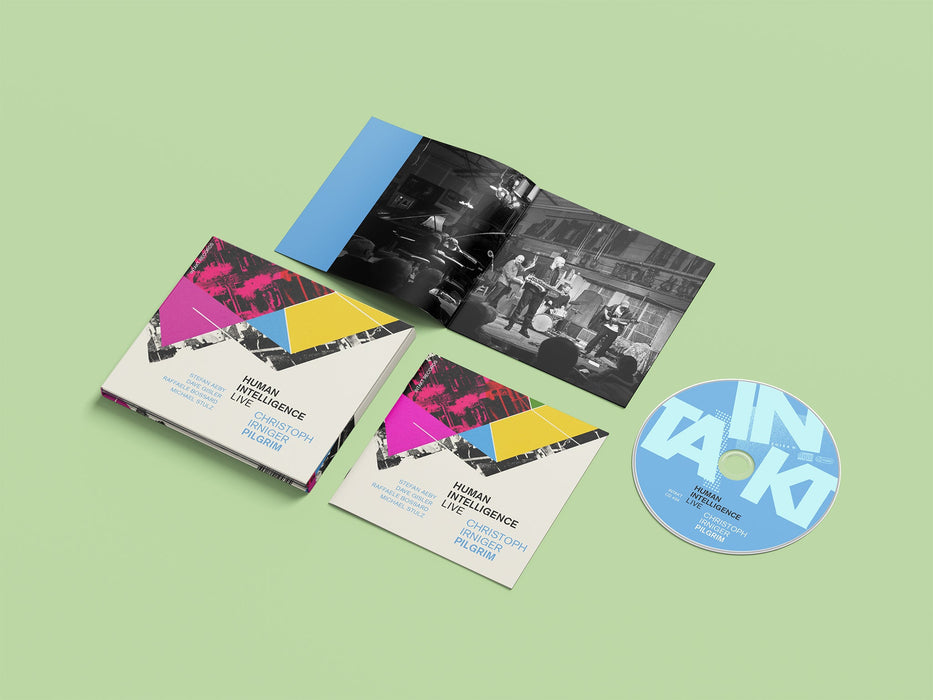
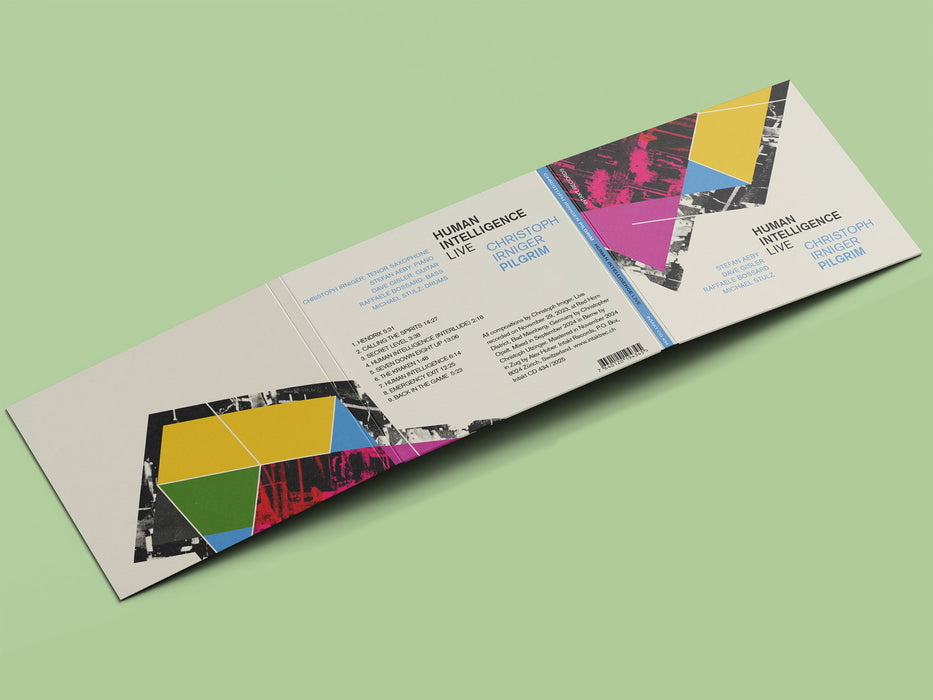

434: CHRISTOPH IRNIGER PILGRIM. Human Intelligence (Live)
Intakt Recording #434 / 2025
Christoph Irniger: Tenor Saxophone
Stefan Aeby: Piano
Dave Gisler: Guitar
Raffaele Bossard: Bass
Michael Stulz: Drums
Live recorded on November 29, 2023, at Red Horn District, Bad Meinberg, Germany by Christopher Opelt. Mixed in September 2024 in Berne by Christoph Utzinger. Mastered in November 2024 in Zug by Alex Huber.
More Info
As a working band that has existed for over 10 years and toured extensively all over the world, Pilgrim has developed its own magical sound. After the highly acclaimed studio album Ghost Cat, this formation driven by the joy of playing and inventiveness around Zurich tenor saxophonist Christoph Irniger presents the vibrant live album Human Intelligence. As a well-rehearsed unit, the band fulfills all expectations of modern and innovative jazz based on internal democracy. The always adventurous quintet brings together electric and acoustic sound worlds and fascinates in this live recording of the concert in the club Red Horn District in Bad Meinberg in Germany with great unity in focused interplay, a balance between the individual instrumental voices and a clarity of structure. „Irniger, who evokes both tranquility and energy on his horn, is drawn to music with a probing, caressing quality, whereby sound, thought and feeling gradually edge to a peak of excitement rather than racing to it", writes Kevin Le Gendre in the liner notes.
Album Credits
Cover art: Jamie Breiwick
Graphic design: Paul Bieri
Liner notes: Kevin Le Gendre
Photo: Markus Ecker
All compositions by Christoph Irniger.
Live recorded on November 29,
2023, at Red Horn District, Bad Meinberg, Germany by Christopher
Opelt. Mixed in September 2024 in Berne by Christoph Utzinger. Mas-
tered in November 2024 in Zug by Alex Huber.
Produced by Christoph Irniger and Intakt Records.
Published by Intakt Records
Né en 1979 en Suisse, Christoph Irniger est un saxophoniste, compositeur et leader dans diverses formations au sein desquelles il a développé un style plutôt innovant et contemporain dans l’univers du jazz. Pour cette performance en public, donnée en 2023 au Red Horn District, Bad Meinberg en Allemagne, il s’associe les services de plusieurs comparses. On notera les présences de Stefan Aeby, Daven Gisler, Raffaele Bossard et de Michael Stulz. Tout ce petit monde pour effectivement concevoir un répertoire contemporain, voire expérimental, où l’improvisation semble omniprésente à travers des passages techniques et pointus. S’alternent des passages mélodiques et fluides, où le saxophone a une place de choix, et des moments plus aventureux, où l’on découvre effectivement une musique innovante et créative. A travers une dominance jazz, on découvrira un beau passage bluesy à la guitare, ainsi qu’un chouette passage technique à la batterie, au sein d’une première composition s’appelant étrangement « Hendrix » ! Notons qu’entre les morceaux, on entendra les applaudissements du public, sinon pour le second morceau, on assistera à une plongée au sein d’un travail expérimental fait de sons épars, au travers duquel filtre un travail plus cadré au piano et au saxophone. Une alchimie atypique, qui pourrait surprendre certains, puisque se côtoient au sein d’une même composition un jeu classique et un jeu improvisé. Côté aventureux et innovant, on décèlera également des passages plus intimistes où tout est joué avec délicatesse et où il faudra tendre une oreille attentive. Au final, des lignes classiques s’enchevêtrent au sein d’un laboratoire sonore où l’innovation et l’improvisation sont de mise. Un résultat créatif !
https://jazzmania.be/christoph-irniger-pilgrim-human-intelligence/
Formation absolument identique pour un ensemble qui a déjà de la bouteille et que nous connaissons bien. C’est le cinquième disque chez Intakt du groupe Pilgrim, fondé en 2010 par le saxophoniste Christoph Irniger (sans compter ses trois disques en trio), et cela se sent immédiatement : expérience (30 concerts par an dont celui qui fait l’objet de ce disque), force, écoute réciproque tout en restant dans un contexte “global” (préparé, cohérent) en ce sens que les cinq musiciens dialoguent à l’intérieur du groupe et des neuf compositions personnelles ; unité et liberté comme l’écrit Kevin Le Gendre dans le livret. Au milieu de ces musiciens de premier ordre, le guitariste Dave Gisler se montre particulièrement en son avantage. Un disque d’un niveau incontestablement supérieur.
https://www.culturejazz.fr/spip.php?article4429
CHRISTOPH IRNIGER PILGRIM: „Human Intelligence Live“ (Intakt Records)
Man könne hören wie die Musik Gestalt annimmt, wie die Kompositionen mit den Improvisationen verschmelzen (und umgekehrt) und die Musik unterschiedlichste Gefühlslagen ausdrückt. Sagt Christoph Irniger über die acht Stücke der live im Red Horn Distrikt in Bad Meinberg eingespielten, neuen Platte seines Quintetts Pilgrim. Seit 2010 besteht die Band des Züricher Tenorsaxofonisten, die hier eine zwar durchdachte und strukturierte, aber dennoch wunderbar offene und kreative Jazzmusik voller Freiheiten spielt, die spirituelle Ausbrüche ebenso in Töne setzt wie meditative Momente.
SIMIN TANDER: „The Wind“ (Jazzland Recordings)
Für einen außergewöhnlichen World-Jazz steht die in Köln geborene Sängerin und Komponistin Simin Tander ja schon seit Jahren. Und auch ihr neues Album steht wieder im Zeichen ihres ganz eigenen Klangkosmos, in dem sich abendländischer Jazz, Improvisation und Einflüsse aus der Folklore Afghanistans, der Heimat ihres Vaters, aber auch des Mittelmeerraums und aus Norwegen so selbstverständlich miteinander mischen, dass man das kaum glauben kann. Und dann diese Stimme. Ob sie nun auf Paschtu singt, auf Englisch oder auf Spanisch, oder auch nur mal mit Silben spielt, es ist egal. Denn es ist wie sie das alles singt, was so berührt und fesselt. Hoch emotional, intensiv, unter die Haut gehend. Wer dann wie Tander auch noch drei fantastische Partner wie die indisch-stämmige Geigerin Harpreet Bansal, den schwedischen Bassisten Björn Meyer und den Schweizer Schlagwerker Samuel Rohrer an seiner Seite weiß, der kann sich bedenkenlos fallen lassen in die alten, traditionellen Lieder, afghanischen Gedichte und Eigenkompositionen.
https://www.virgin-jazz-face.de/cd-besprechung.html
Il quintetto Pilgrim, diretto ormai da una quindicina d'anni dal tenorsassofonista svizzero Christoph Irniger, giunge con questo Human Intelligence al suo sesto album, portando avanti la logica di un suono piuttosto identitario, derivante dalla contemporanea presenza di piano acustico e chitarra elettrica, ma non solo: vi aleggia una risolutezza piuttosto palpabile, un impianto solido e generalmente affermativo, pur non mancando ovviamente i momenti di ripiegamento più o meno marcato, il tutto probabilmente accentuato, nel caso specifico, dal fatto di trovarci di fronte a un'incisione dal vivo (novembre 2023).
Le rotte battute dal gruppo non sono particolarmente avventurose, ma appunto la capacità di generare comunque un suono d'insieme e architetture chiare, riconoscibili, genera in chi ascolta un senso di appagamento sia nella componente fisica che in quella mentale, visto che in questa ora abbondante di musica non ci sono momenti di stanca, un qualsivoglia senso di routine o di maniera, e invece un'estrema attenzione a far trasudare la musica, a darle sempre un senso compiuto, una logica intestina assolutamente coglibile.
Tutto ciò che connota, insomma, un album di pregio e spessore, qualunque sia la posizione di chi vi si avvicina.
https://www.allaboutjazz.com/human-intelligence-live-christoph-irniger-pilgrim-intakt-records
Auf ihrem sechsten Album präsentiert sich die Formation Pilgrim des Zürcher Tenorsaxophonisten Christoph Irniger in der gewohnten Besetzung mit Stefan Aeby am Klavier, Dave Gisler an der elektrischen Gitarre, Raffaele Bossard am Bass und Michael Stulz am Schlagzeug. Ungewohnt ist die Versuchsanlage: Der 64-minütige Live-Mitschnitt vom 29. November 2023 aus dem Klub Red Horn District in Bad Meinberg (NRW) gibt das Konzert ungefiltert wieder. So gut wie nichts wurde editiert, und da es keine fixe Setlist gab, erleben wir die Musiker auf verschlungenen Pfaden zwischen freier Improvisation, solistischen Eskapaden und dem Sich-Zusammenfinden in neuen Stücken oder solchen, die sie schon oft gespielt haben. Einige Tracks werden gründlich gestaltet und umgestaltet, andere nur angetippt. Die Band kann sich viel erlauben, weil sie in den fünfzehn Jahren ihres Bestehens zu einer Einheit in der Vielfalt zusammengewachsen ist. Gleichwohl kann bei diesem Konzept nicht alles gleichermaßen gelingen. Es gibt Wege und Irrwege, energetische Ballungen und innige Momente, aber auch Passagen, in denen Fäden fallengelassen werden und weniger passiert. Diese gehören freilich zum Ganzen: Nur wo es Spannungswechsel gibt, wird Spannung überhaupt wahrgenommen. Die Reise beginnt mit einer Hommage von Gisler an Jimi Hendrix, bevor in >>Calling the Spirits<<< buchstäblich vorgeführt wird, wie eine Gruppe zusammenfindet. Die Mehrzahl der bereits bekannten Stücke entstammt dem Album >>Ghost Cat<< von 2023, so auch die weitausgreifende Lesung von >> Seven Down Eight Up<<: Sie illustriert das Aikido-Prinzip, nach dem man immer einmal mehr aufstehen als hinfallen muss. Ein guter Rat, den man auch beim Anhören dieses teils irritierenden, teils faszinierenden Mitschnitts beherzigen sollte. Mit dem symbolhaften Titel >>Back in the Game<< aus der >>Italian Circus Story<<< von 2014 endet die Abenteuerfahrt.
The quintet Pilgrim, formed by the now 45-year-old Swiss saxophonist and composer Christoph Irniger back in 2009, is an exploratory, warmly interactive ensemble whose music can’t be pinned down in terms of a recognised genre; or even as a crossover of various styles. Rather, improvising and evolving organically as a collective – one that’s been honed over more than a decade and a half of working together – seems to be the group’s raison d’être. There’s often a real sense of clarity and structure in their music, with a balance between the individual instrumental voices.
Recorded at the club Red Horn District in Bad Meinberg, Germany, Human Intelligence – Live sees Pilgrim embracing the avant end of rock, most overtly on opener ‘Hendrix’; and although Dave Gisler hits the gears with some jazz rock-fuelled guitar lines, the piece sounds like a dedication by way of composition and approach, rather than more familiar psych-rock guitar innovations.
‘Calling the Spirits’ meanwhile has Irniger’s sax echoing Cosmic Music-era Coltrane – but there’s a warm vulnerability to his sound that lends it a very personal (and pleasing) signature.
The band can shift very convincingly between angular New York downtown-ish jazz skronk and tenderly enigmatic lyricism; and Irniger’s fluid compositions tend to naturally evolve with fresh perspectives discovered along the way, thanks to the open-minded flexibility of the personnel. But there’s nothing here that [immediately] calls attention to itself.
For maybe that reason, Human Intelligence – Live is an album that’s not so easy to grasp at first, especially out of the ‘live’ context in which it was created. Given time and repeated listening though, it’s a grower – and in a deeper sense too.
https://www.jazzwise.com/review/christoph-irniger-pilgrim-human-intelligence-livee
Cadence: Ken Weiss, MD last interviewed you for our October 2015 issue and of
course there have been some major shifts in the world? Please delve into how
COVID affected your musical and personal life?
C.I.: Since 2015 there have been a few shifts in both my musical and personal
life, such as birth of my 3rd child or moving to the house where my wife grew
up in Zurich, as also heavy touring (including the US) with my band Pilgrim
and of course Covid, which was a big game changer in many ways.
What concerns myself as a musician, Covid helped to move forward: Since
there was nothing to do for almost half a year, I started researching and to
further my education in composition, what I always wanted, but never had time
to. My effort resulted in a new repertoire for Pilgrim, as also in a collaboration
with the Swiss Jazz Orchestra and my debut as Big Band composer.
On the business side I think it caused many issues, which the scene is still
suffering from. In general there is less money for non-commercial culture,
which affected many jazz initiatives, media and clubs. The possibilities and
money to earn are/is less than before and the liability is worse due to this
economic uncertainty. Sometimes concerts are not confirmed until shortly
before the tour or got cancelled very short term, so it definitively got tougher on
the market.
That said, the scene might has become also more agile and sometimes
possibilities show up on different occasions. I don’t want to complain. Luckily
as bandleader, who is interested in many fields, I am used to be vigilant and try
to catch trains when they come.
Cadence: Jazz has always had a history of musicians returning back to school
for further education (I think of Max Roach and Tony Williams); what kinds of
musical ideas were expanded by you formally retooling?
C.I.: I’d say you never leave school as a serious artist. Being able to perform on
a high level needs daily training and as a bandleader you have to work on you
vision constantly.
One thing I was very extensively working on my instrument in the last year
was the phrasing, since I had the feeling it felt kind of sticky and I wanted it
to be more fluid. So I was searching for instrumentalists that have the feeling
I searched for (like Wayne Shorter or Dayna Stephens), played along and
transcribed solos. Imitating is always a good plan to start on something new.
Another field I am constantly working on is composition. It’s like a muscle,
which you can train to get stronger and it was always very important to me,
beyond composing itself, but also for developing a personal language on the
instrument and of course a vision as artist.
Something I found very interesting is the idea of voice leading. My
compositions are built mostly out of single lines, such as a melody and a bass
line and harmonies evolve out of these lines (voices) played together. So you
have recognizable melodies and harmonical richness at the same time, which
gives the improviser or the improvisers (depending on how many are playing
at the same time) more options to create worlds between relaxation and tension
or openness and density.
Guillermo Klein told me to analyze, study and re-write Bach Chorals, which I
still do and helps a lot for understanding, hearing and having new ideas.
Cadence: I want to double back on the expansion of your orchestral language
but in the mean time let's talk about the viability of the cd format. This
interview is taking place while you have a 2025 CD on the Intakt label;
"HUMAN INTELLIGENCE LIVE" (Intakt CD 434). Please explain why you
continue to release your music on disc? Do you see a monetary return by such
recordings?
C.I.: No, I honestly don’t see a monetary return. The value of a CD for me as a
musician is on one hand emotional and on the other promotional. It is first a
documentation of my work, something to hold in my hand, which delivers the
music together with a nice artwork and tells a story. The economic value lies
more in connection with the promotion, since I think a release on a physical
carrier makes a band still more relevant for media and promoters.
Cadence: Just to clarify for all of the recordings you have done on Intakt even
taking in account new digital formats and streaming services; you have never
seen any kind of monetary reward from your music? What about also the idea
of selling disc at your concerts also. I double down on this because it calls into
the whole notion of the value of recording especially in light of your PILGRIM
band being one of the most active groups in Europe?
C.I.: The income of physical and digital outcome on the market goes to the label
until break even. The reward after that is peanuts. I do sell CDs on concerts
not bad, but this goes back to the production, which is for most of the part
supported out of public and private cultural funds and by people who are
enthusiasts and work for a low income, such as the musicians, producers, etc. If
you do the numbers without that support...
Working through a series of tenor saxophonist Christoph Irniger’s compositions, the Swiss Pilgrim quintet uses this live session to personify its variant on contemporary improvisation. Well played with just a touch of extended techniques, the program is substantive, but not as daring as the audience – and possibly the musicians – considered. With the straight-ahead stance rarely breeched, forays into Rock-styled flanges from guitarist Dave Gisler and a few intense squeaks and split tones from Irniger appear to be carefully controlled departures, which underscore the linear nature of the tunes, Bassist Raffaele Bossard’s pizzicato variables usually take the form of low-key thumps, while pianist Stefan Aeby mostly concentrates on disciplined comping and coloring, with the same intent from drummer Michael Stulz’s smacks and thumps.
That means most tunes are propelled like “Emergency Exit”. Forward motion is emphasized, with moderated piano expressions widening into the melody, only slightly interrupted later on with reed honks, doubled drum pumps and expanded guitar licks. Only bisected with a few short interludes, this policy is followed pretty much throughout the set. Irniger’s reed flutters and expressive variations frequently fasten onto keyboard slides, which when joined by one or another of the players evolves with multiple counterpoint.
Intensity and emphasis are more extrusive when band members stretch out a little further as they do on “Calling the Spirits” and “Seven Down Eight Up”. The first is atmospheric enough to echo 1970s spiritual Jazz with piano syncopation and double bass buzzes preserving the broken octave evolution. This surface gives the saxophonist a base on which to express doits and honks while Gisler seems to alternate between chamber patterns and charged projections.
This seeming unwillingness to go beyond the limits of decorum affects the entire session even when as on “Seven Down Eight Up” it appears the five are prepared to go further. Effervescent with a stop-time exposition propelled by the pianist’s light-fingered groove and Bossard’s pizzicato variable, the pace picks up as intermittent bass thumps back Irniger’s note-bending ascends to intense double tonguing and near screeches seconded by the guitar’s blurred fingering flanges and Stefan Aeby’s double speed comping, The saxophonist though soon relaxes his outpourings joining with the pianist to repeat theme variations.
An adept night’s work for an appreciative audience, Human Intelligence clearly shows what this group of pilgrims offer in a live setting. A wish that this pilgrimage had been more challenging and move into unfamiliar territory exists however.
https://www.jazzword.com/reviews/christoph-irniger-pilgrim/
It's hardly news that jazz is a music best experienced live. Swiss tenor saxophonist Christoph Irniger clearly embraces this reality, recognizing what his long-running quintet Pilgrim can bring to the stage, where spontaneous decisions about shifting arrangements or even a set list can energize and inspire any given performance. Human Intelligence Live is the band's second live album among the six records they've released since 2011, and when you hear them navigate the opening of a piece like "Calling The Spirits," feeling out ambiguous terrain and trusting in a deep internal rapport, the simultaneous excitement and sense of vulnerability produces a livewire vibe that can't be replicated in the studio. About 8:40 into the piece, drummer Michael Stulz drops a snare bomb that elicits a sudden cry from one of the musicians, a pinpoint rupture of its cool vibe.
Balancing previously recorded gems with a passel of new tunes, Pilgrim hypercharges the contrapuntal sophistication that marks the leader's compositions and arrangements. The music occupies a modern mainstream sensi-bility built upon extended melodies and volatile introspection, where at any moment the mainstream values in jazz, and 30 years on he has refined them to the nth degree.
Take the opening pair here. "Cured And Seasoned" offers jazz that sounds as if it has been preserved from the vagaries of fashion weather by that paint company's product. It's old-fashioned hard-bop with modern materials, suffused with post-bop surprise but also an old gospel feel; more moving gospel occurs later on with "There Is A Fountain." Often, sitting in a club, one hears the intro to "Autumn Leaves" with a faint sigh, not from nostalgia, but in fear of another hackneyed wander through a fall landscape. And what does Cyrus do? He suckers the listener with the cliché (the old chestnut, you might say) before swirling off into a dance that will convince you autumn is the first season of the year. "Ami's Dance" and "Twinkle Tones" confirm Gerald Cannon's importance to the group, and Chris Beck's, while "Song For The Andes" shows that far from being a plus-one Stacy Dillard is absolutely central to the group sound.
What it doesn't say on the tin, it shows on the tin. Cyrus' smile on the cover is the clincher. This is a man who loves the music immoderately, and it spills out of him.
Vergesst die Cowboys From ****, CHRISTOPH IRNIGER, der Zürcher Tenorsaxer, hat
längst die Colts weggelegt und sich anderen Spielen zugewendet - mit seinem Trio, zu
zweit mit dem Pianisten Marc Perrenoud, im David Regan Orchestra. Und insbesondere
mit PILGRIM, dem seit 2010 aktiven Quintett mit Stefan Aeby am Piano, Dave Gisler an EGitarre,
Raffaele Bossard am Kontrabass und Michael Stulz an Drums, das nach „The Music
of Pilgrim“ mit dem Swiss Jazz Orchestra und zuletzt „Ghost Cat“ nun H uman Intelligence
Live (Intakt CD 434) offeriert. Es ist das der Konzertmitschnitt vom 29.11.2023 im
Red Horn District, Bad Meinberg. Mit 'Calling the Spirits', 'Seven Down Eight Up' - in Referenz
an Nik Bärtsch und dessen repetitiven Module - , und 'Secret Level' (von „Ghost
Cat“), dem hier doch lieber nicht geweckten 'The Kraken' (von „Big Wheel Live“) und dem
vom altmodischen Vater-Tochter-Baseball-Drama mit Clint Eastwood inspirierten 'Back in
the Game' (von „Italian Circus Story“). Aber verzahnt mit neuem Stoff: 'Hendrix' (als wie
auch '7 Down 8 Up' gefundenes Fressen für Gisler), 'Human Intelligence' (als Pochen auf
ein Mindestmaß an Vernunft) und 'Emergency Exit' (als Labyrinth mit glücklichem Ausgang).
Der britische Musikjournalist Kevin Le Gendre findet mit stellar slow burn, solemnly
beautiful und engagingly contemplative derart zutreffende Worte für die auf kleiner Flamme
siedende Sinnlichkeit und Melodik der Schweizer, dass ich mich zurücklehnen und
ohne Stirnrunzeln ihre polymorphen, nie wattebauschigen Wolkenformationen genießen
kann. Und ihre komplex rhythmisierten, farbig gefiederten, insistent exerzierten Kranichtänze
sogar noch etwas mehr. Fragt sich nur, wie lange das delikate Rühren an Herz und
Hirn noch mit dem kannibalischen Heißhunger ringsum konkurrieren kann?





